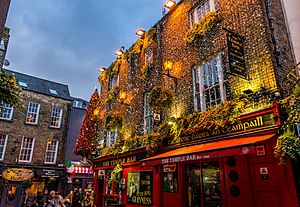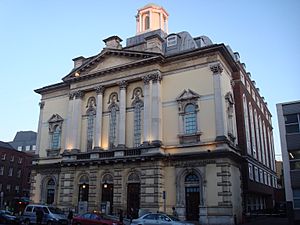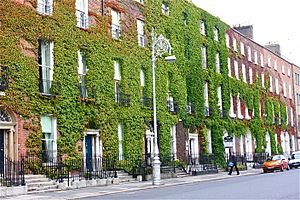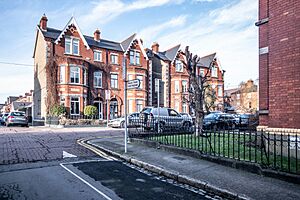Southside, Dublin facts for kids
Quick facts for kids
The Southside
|
|
|---|---|
|
Informal region (Dublin, south of the Liffey)
|
|

|
|
| Country | Ireland |
| County | Dublin |
| City | Dublin |

The Southside (which in Irish is Taobh Ó Dheas) is a part of Dublin city that is located south of the River Liffey. It's a common way people talk about this area, even though it's not an official boundary.
Historically, the Southside has often been seen as richer and more privileged than the city's Northside. However, this isn't always true. For example, Malahide, a very wealthy area, is on the Northside. On the other hand, some areas with lower incomes, like Jobstown and Sallynoggin, are found on the Southside.
Exploring Southside Areas
The Southside includes the heart of Dublin city centre that lies south of the Liffey. This includes famous places like Grafton Street, known for its shops. It also covers older city areas such as The Liberties / The Coombe and the lively Temple Bar.
Beyond the city centre, the Southside stretches out to many districts. Most of these names are very old. Many were once small rural areas called "townlands" before Dublin grew bigger.
- Adamstown
- Ballinteer
- Ballsbridge
- Ballyboden
- Ballybrack
- Ballyfermot
- Ballymount
- Ballyroan
- Belfield
- Blackrock
- Booterstown
- Cabinteely
- Cherrywood
- Churchtown
- Citywest (business park)
- Clondalkin
- Clonskeagh
- Cornelscourt
- Crumlin
- Dalkey
- Deansgrange
- Dolphin's Barn
- Donnybrook
- Drimnagh
- Dundrum
- Dún Laoghaire
- Edmondstown
- Firhouse
- Foxrock
- Glasthule
- Glenageary
- Glencullen
- Goatstown
- Greenhills
- Harold's Cross
- Inchicore
- Irishtown
- Jobstown
- Killiney
- Kilmacud
- Kilmainham
- Kilternan
- Kimmage
- Knocklyon
- Leopardstown
- Loughlinstown
- Lucan
- Milltown
- Monkstown
- Mount Merrion
- Newcastle
- Park West
- Palmerstown
- Ranelagh
- Rathcoole
- Rathfarnham
- Rathgar
- Rathmichael
- Rathmines
- Rialto
- Ringsend
- Rockbrook
- Saggart
- Sallynoggin
- Sandycove
- Sandyford
- Sandymount
- Shankill
- Stepaside
- Stillorgan
- Tallaght
- Templeogue
- Terenure
- Walkinstown
- Whitechurch
- Windy Arbour
Understanding Dublin's Postcodes
Dublin uses a system of postal districts to help sort mail. Traditionally, postal codes on the Southside start with even numbers. For example, College Green is in the D02 district, often just called "Dublin 2." The area of Tallaght is in D24.
The Northside postal codes usually start with odd numbers.
There is one interesting exception to this rule: Phoenix Park. This large park is actually on the Northside, but it's part of the D08 postal district, which is an even number. A historian named Pat Liddy explained why. Long ago, the James's Street Postal Sorting Office, which was on the Southside, handled mail for Phoenix Park. This was because it was considered closer and easier to reach than other offices. When postal codes were created, this arrangement continued, so Phoenix Park became part of Dublin 8.
Newer "A" postcode areas have been added to southern Dublin, especially in the outer parts of the Southside and much of Dun Laoghaire-Rathdown. Some of these "A" areas are also in County Wicklow and County Meath, and some are north of the Liffey in Fingal.
These "A" areas are different from the older numbered postal districts. However, they are now all part of the new Eircode system, which helps make addresses even more specific. For example, Blackrock is in Dublin A94, while Dun Laoghaire is in the A96 area.
Since the Eircode system started, Southside postal addresses can look a bit different depending on whether they are in an old numbered district or a new "A" area.
Here is an example of a postal address within the traditional Dublin postal districts:

- The Shelbourne Hotel,
- 27 St. Stephen's Green,
- Dublin 2,
- D02 K224.
And here is an example of a Southside postal address from one of the newer "A" areas:
- The Mellow Fig,
- 5A George's Avenue,
- Blackrock,
- County Dublin,
- A94 XK11.
See also
 In Spanish: Sur de Dublín para niños
In Spanish: Sur de Dublín para niños
 | Tommie Smith |
 | Simone Manuel |
 | Shani Davis |
 | Simone Biles |
 | Alice Coachman |



